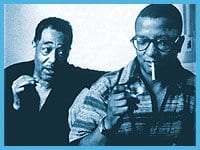Billy Strayhorn was a rarity – not only for his inestimable talents as a composer, arranger and pianist but for his refusal to accept institutional, legal and social limits as a black gay man.
By the time he came of age in the 1930s, there had been some progress toward what would become the civil rights era for African Americans, but there were few glimmers of hope that the end of gay oppression was near. The daily fight against the horrors of racism encouraged him to stand up just as passionately for his rights as a gay man.
For three decades, Strayhorn, whose 89th birthday would have been on Nov 29, was an integral part of one of the 20th century’s most extraordinary musical institutions, the Duke Ellington Orchestra. But at the same time as he was helping to create a series of jazz masterpieces, he faced a life of hardship because of his skin colour and sexual orientation.
From the moment of his arrival in New York in 1939, Strayhorn was open about his homosexuality in an era when most gay men and women tried hard to keep their sexual identities secret.
In the lyrics to the song “Something To Live For,” the young musician, still stuck in Pittsburgh but dreaming of Paris and New York, had written of his yearnings: “I want something to live for/ Someone to make my life an adventurous dream/ Oh, what wouldn’t I give for/ Someone who’d take my life and make it seem/ Gay as they say it ought to be/ Why can’t I have love like that brought to me?”
Living and working in New York in a time of hostility and witch-hunts, he made every effort to live up to his adventurous dreams. He entered into long-term relationships that were defined by their openness and visibility. He took a leading role in a number of groups that consisted of proudly black and gay writers, performers and artists, attesting to Strayhorn’s importance as mentor and role model to others inhibited by society’s ingrained racism and homophobia.
David Hajdu, Strayhorn’s exemplary biographer, quotes a gay friend as saying: “We all hid, every one of us, except Billy. He wasn’t afraid. We were. And you know what the difference was betwen us? Duke Ellington.” Ellington provided Strayhorn with an out-let for his artistry and with emotional support. The same friend explained, “Billy could have pursued a career of his own – he had the talent to become rich and famous – but he’d have to be less than honest about his sexual orientation. Or he could work for Duke and be open about being gay. It was truth or consequences and Billy went with truth.”
Born in 1915 and growing up poor in Pittsburgh during the Great Depression, the prodigally gifted Strayhorn recognized early on that he faced insurmountable barriers to a career in classical music. Instead the young musician became interested in jazz – a popular but then revolutionary art form that made artistic and financial sense for a young black man in the 1930s.
An extraordinary meeting in 1939 with Ellington resulted in a dream job offer. From then until his death in 1967 Billy Strayhorn acted as the musical double for Ellington: finishing compositions and arrangements for Ellington, starting pieces for Ellington to work on, orchestrating previous Ellingtonia in new ways and single-handedly running the vocal department of the orchestra. At the same time he was imparting his knowledge about music theory, classical composers and new theories of orchestration and composition to his self-taught and intellectually ravenous employer.
Edward Kennedy “Duke” Ellington produced unsurpassed jazz music for more than 50 years. From his early days in the 1920s until his death in 1972 his orchestra employed artists who made musical contributions that were often equal to his own. Early mentors and individual soloists alike became co-composers of the Ellington music catalogue and the Ellington orchestral sound. And for almost 30 years Strayhorn was Duke’s most important collaborator in a decades-long process of collective music making.
This collaborative system has meant that Strayhorn’s contributions are difficult to describe precisely. But within the Ellington catalogue his work stands out with style and substance. Popular song compositions like “Take The A-train,” “Lush Life,” “Day Dream” and “Lotus Blossom” or his co-composition of extended works like The Far East Suite, Such Sweet Thunder and The Perfume Suite attest to the brilliance of his musical ideas and skills.
Strayhorn died a tragically early death in 1967 from cancer of the esophagus. His artistic achievements and his openness during a time of persecution should be enough to ensure that his memory, unlike so many other black or gay artists, is not condemned to a future of neglectful ignorance.

 Why you can trust Xtra
Why you can trust Xtra


